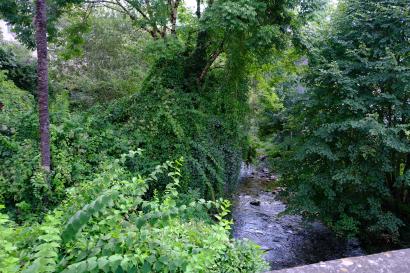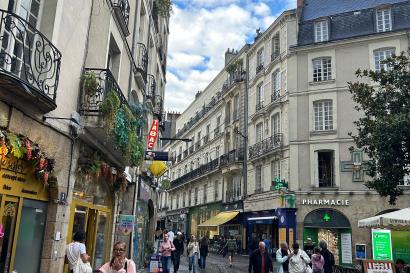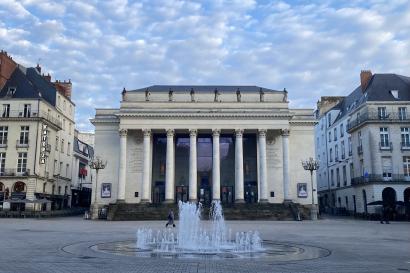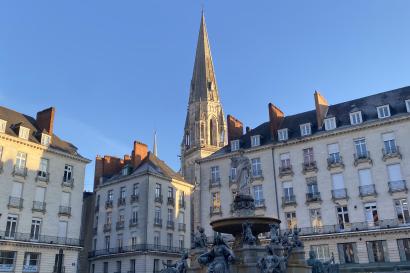
My decision to study abroad is both one that seemed natural based on my area of study (as a literature and language major), as well as something that I didn’t feel a need to justify to myself. As someone who really enjoys experiencing foreign and novel perspectives through literature, art, and film– to the extent that I have arranged my studies to further that goal– study abroad fits right into my niche. It makes sense. However, as much as I love to travel and cherish deeply the memories that I have been able to make from the position of a traveler / tourist, the perspective from which everything is more beautiful, more impressive, and more grand than at home, study abroad is not the opportunity to take a break from school and travel for six months.
The position of the tourist is one fundamentally removed from the experience of the local. You walk along the streets, through museum halls, looking up at the beautiful monuments and buildings that surround you, yet there remains a huge barrier between the people who live there, who seem inaccessible, and the place. It is a barrier that is quite literally physical– you are not present in their houses or sitting at their tables and you are often not even speaking their language. This is not to say locals are being unfriendly, just that you are experiencing the city in a much different way than a local does. As someone from San Francisco, I feel often, when I see tourists, that they are missing out on the parts of the city that make it so special to me. Part of my goal in being in a new place is to get a sense of what it’s like to live there, and this goal is difficult to realize due to both a touristic mystique the place may take on and the inability to breach this local barrier.
Study abroad, especially the kind of full immersion program offered by IES Abroad Nantes, gives students the opportunity to cross this difficult barrier. To a certain extent, any study abroad program allows you to bridge this gap through continued exposure to the place. Exposure allows you to get to know a city, growing your confidence within it as you make new relationships to the city and its people, and allows that romantic, pretty, and ultimately rather false touristic glow to wear off. The city makes the transition from somewhere you have visited to somewhere you lived. To *really* cross this boundary, though, you must completely immerse yourself. This is the part of IES Abroad’s program that appealed most to me.
I’ve taken French for almost two years after having taken Latin for eight years and Spanish to an intermediate level. So the plan, since I started French my freshman year of college, always involved some degree of study abroad in France in order to get it up to scratch. I want a degree of fluency. Last summer, I embarked on a rather similar and rather unsuccessful six week summer abroad program through a different organization (not IES) in Paris. The issue was two-fold, and in ways my fault. The first problem was that my French was not good enough to stand up to Parisians in the wild (outside of ordering, talking to the grocer, etc. I was not able to communicate to Parisians in a way that I could make friends with them) and that there was no other, safer, space to practice my French. The second problem was that Paris, as a city filled with tourists and where most of the population speaks English, is not the best place to gain independent French. I was stuck in a permanent state of “American tourist,” where nobody got to know me and I ended up speaking much more English than French. The IES Abroad Nantes program offers solutions to solve these problems.
First of all, Nantes and Brittany itself. Last summer, after the program, I visited Belle Île in Brittany. It is, to be completely honest, the most beautiful place I have been in my entire life (I would really recommend anybody to go). It is a place straight out of a fairy tale. Also straight out of a fairy tale, la forêt de Brocéliande, a forest in central Brittany where King Arthur and Merlin are said to have walked. It seems touched by magic and legend in way that few places in the U.S.A. are. The coastlines of Brittany are picturesque and beautiful. The city of Nantes seems like the perfect size, allowing you to become comfortable and known within it while also offering the size, resources, and options of a major European city. It’s a good sample of both contemporary and traditional French culture.
Secondly, the program. IES Abroad Nantes offers two major supports that would be difficult to replace on your own. The first is the cultural and language support that comes with the host family. Allowing you into their home, the host family gives you a safe place to take part in local culture and the support you need to make that change. IES Abroad provides you with classes and orientation to a life in French, granting needed assistance in making the difficult transition. These are two facets of the program that really appealed to me and my hope is that they are successful in integrating and immersing me in the French culture, allowing me to feel at home in foreign country. I feel that this is the real strength and selling point of a semester abroad. It offers the chance to be at home in a place where I otherwise would be only a tourist.

Charlie Sears
Hi, my name is Charlie Sears. I am from San Francisco, California and go to school in Los Angeles. I am a Comparative Literature major with a focus on English, French, and Latin lit. I also like to hike, surf, watch movies, and play with my dog.





